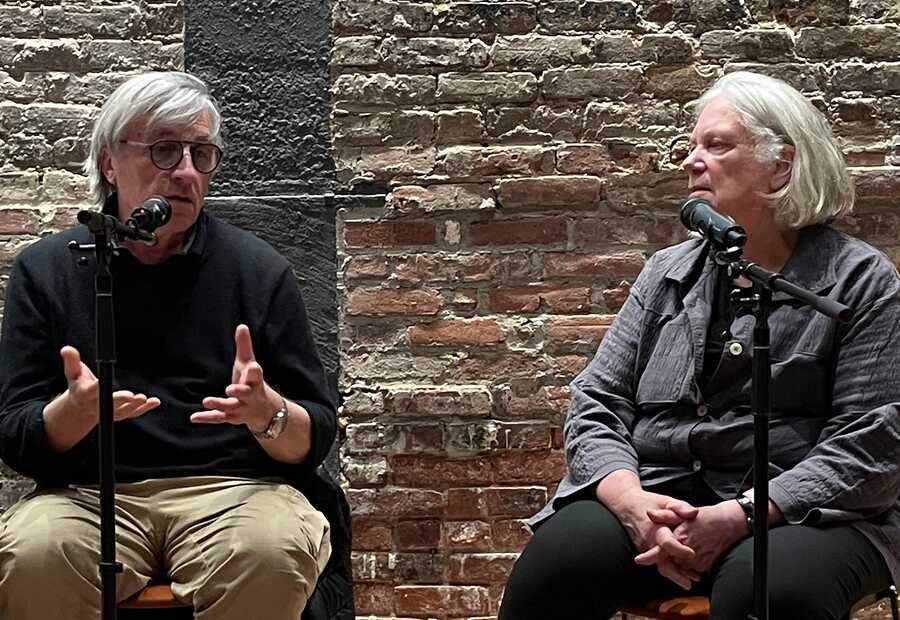Among other things, it was a night of first-class theatre stories and vivid metaphors for the rehearsal process. The American director Anne Bogart compared to herself to a pregnancy test that actors pee on and related a harrowing/hilarious Tadashi Suzuki anecdote; the Russian director Dmitry Krymov drew revealing analogies with chefs, fishermen, and motorcycles, and told of Oleg Yefremov’s revenge on a wayward actor.
The occasion was their coincidental convergence at La MaMa, New York City’s venerable experimental hub, in late April: Bogart was about to open a production of The Beautiful Lady, a musical by Elizabeth Swados and Paul Schmidt about the intertwining lives and work of a group of poets around the time of the Russian Revolution and thereafter (it played to acclaim May 5-28). Krymov, a legendary Russian director and teacher whose opposition to the war in Ukraine has stranded him here in the U.S. for the foreseeable future, was starting work on Krymov Lab NYC, in which he’s creating a new piece with an ensemble of American and international actors. (Big Trip, a two-program offering that comprises Pushkin “Eugene Onegin” in Our Own Words and Three love stories near the railroad, starts performances there this weekend and runs through Oct. 15.)
With the help of the nimble translator and Krymov Lab lead producer Tatyana Khaikin, Bogart and Krymov compared notes on their approach to actors and audiences, where they are in their respective careers, and what this historical moment calls for from artists. In the audience were several members of both Krymov’s lab and Bogart’s Beautiful Lady ensemble. The following transcript has been edited from a longer conversation for clarity and concision.
ANNE BOGART: I’m thrilled to be sitting with Dima; you’re somebody I admire very much. I’m gonna start by asking you a really unfair question, which I think is on many of our minds, because, as everyone knows, you’re here not really by your volition but by necessity. It’s a great thing for New York that you’re here, and it’s a great thing that La MaMa is producing your work and your company’s work. You’ve worked in some of the largest theatres in Russia and are highly respected, and you find yourself working in tiny little spaces. How does it feel to go from being a big deal in Russia to in a way starting over?
DMITRY KRYMOV: You know, yesterday I was recognized at Le Pain Quotidien; some woman said, “I know you.” So I’ve made it.
BOGART: Wait until the next time you go in, and they’ll say, “The usual?” But you’re avoiding the question.
KRYMOV: Do you want me to answer seriously? I was trying to escape it. It’s a horrible question. Not that I need to complain. When Fellini was dying and he was in a hospital, he told somebody that he was watching the toes on his left foot, and he is coming to conclusions as he’s looking at his toes. He wasn’t saying that he couldn’t move, that he was dying—he knew he was, and he died a month after that. But he was researching and looking at life from the point of view of moving toes.
BOGART: That completely answers the question.
KRYMOV: Spasibo.
BOGART: Right now I’m working with a group of actors who are playing the great Russian poets during the Russian Revolution, most of whom either committed suicide or were killed, including Mayakovsky, Akhmatova, Tsvetaeva, Osip Mandelstam, etc. These American actors are performing the worst moments of their lives. And it’s never interesting for an audience to watch somebody suffer, right? It’s more interesting to watch an actor playing a character who is fascinated by their toes. You can’t play tragedy with tragedy; you have to play tragedy with hope. And so that answer about Fellini’s toes—it’s something I’m going to use tomorrow in rehearsal. I think we can end this whole conversation with the toes of Fellini, but perhaps you’d say more nevertheless.
KRYMOV: Well, I feel okay right now, perfectly normal. In the morning, it’s sort of not very good, but then it goes on. If I have a rehearsal, I’m totally fine. If I don’t have a rehearsal, of course, I don’t feel that great. The first month, when you turn around and you see the abyss behind you—there’s nothing behind your back, nothing is supporting you. It’s the scariest feeling. It’s like Fellini looking at his toes. It’s a very, very unpleasant feeling. I’m not even sure that I’m missing many things in what you might call the motherland, it’s just that you feel that your back is not supported by anything and you can fall down into the abyss. It’s a catastrophic feeling—you feel the catastrophe behind you. And slowly, okay, it’s moving a little further away from me. I have a meter and a half now. It’s no longer the feeling like you’re standing on the skyscraper with your heels sort of hanging off and you can fall off; now it’s a little better. So I’m very grateful to the theatre and the people who are in the theatre. Somehow they’ve rescued me—you know, I was in the water, and they came over with a little boat and they said, “Hop in,” and somehow we’re going to row together.
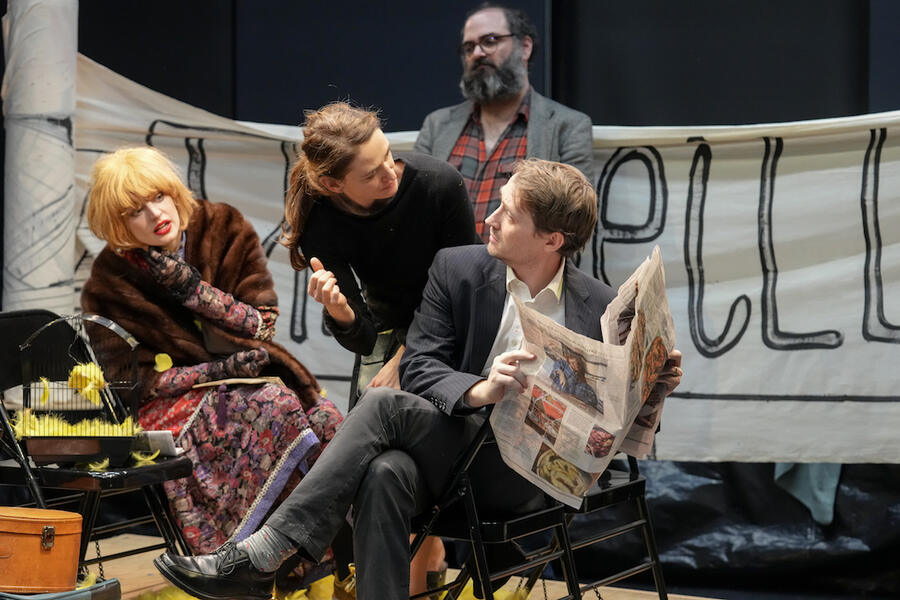
BOGART: You know how directors are always jealous of each other? When I see the actors coming out of your room, they always seem so full of life—they’re dancing on the street, they seem really happy. And I think, God, I wish my room were like that.
KRYMOV: I have a question for you, Anne.
BOGART: I have so many for you.
KRYMOV: I have just one. I have a problem, and I want to ask for your advice. What is interesting right now in this particular time? You understand that I am from Russia and Russia is aggressive and so on, but if you were to find out that I’m directing something, what would make you think, “Oh, this is a great idea. He is a great guy.” What would that be?
BOGART: Well, the first part of your question is really interesting to me, which is, what matters right now in this country, this city—what matters to be making work about? It’s actually related to something I wanted to ask you, so I’m going to bring it up. It’s something that’s been on my mind a lot in the last couple of months, working on a play that’s about a bunch of Russians. Before we went into rehearsal, I called [La MaMa artistic director] Mia Yoo and I said, “Have you seen the New York Times article about the architecture exhibit at Cooper Union, about a Bauhaus-type movement in Russia?” It was, I think, a small exhibit, and the Ukrainian community here in this area rose up and said, “You cannot do this. You can’t do something about a Russian movement.” Of course, I was very concerned about that, because our show is talking about a Russian movement in the past.
“I think that the great subject of our moment is whether or not we are allowed to speak.”
To answer your question, I think the topic of the moment is how we are being censored, and how we are censoring ourselves from the inside, in the way that we are not allowed to speak certain words or we’re not allowed to touch in a certain way. I think that the great subject of our moment is whether or not we are allowed to speak. There’s something that Athol Fugard said once: Censorship is not from the government—it’s the hesitation of his hand when he’s writing, wondering if it will be received. I think the subject matter that would be interesting is to address how we are being censored as human beings in our lives right now, and how there’s a movement which is wiping out any possibility of crossing boundaries—but crossing boundaries is the only place where progress can happen, and if we stay away from each other and don’t use certain words or don’t show certain exhibitions or don’t talk about Russian poets, then we don’t have the opportunity to be uncomfortable.
The idea of being comfortable is really uninteresting; I can’t tell you how many times the word comfort is used now, more than it ever used to be. I remember years ago, watching a young director in a tech rehearsal, and he kept saying to the actors, “Are you comfortable?” “Are you comfortable?” And I kept thinking, is that what a rehearsal is about, being comfortable? I wasn’t sure that’s the right question to answer. Now, I understand there are political reasons for it, and it’s also something we need to examine. But I really worry about the boundaries that we’re making between each other. Our own fear of learning any other language, our own fear of crossing boundaries—that’s the subject, I think. When I said had a lot more questions, I was curious to bring up the issue of that exhibition.
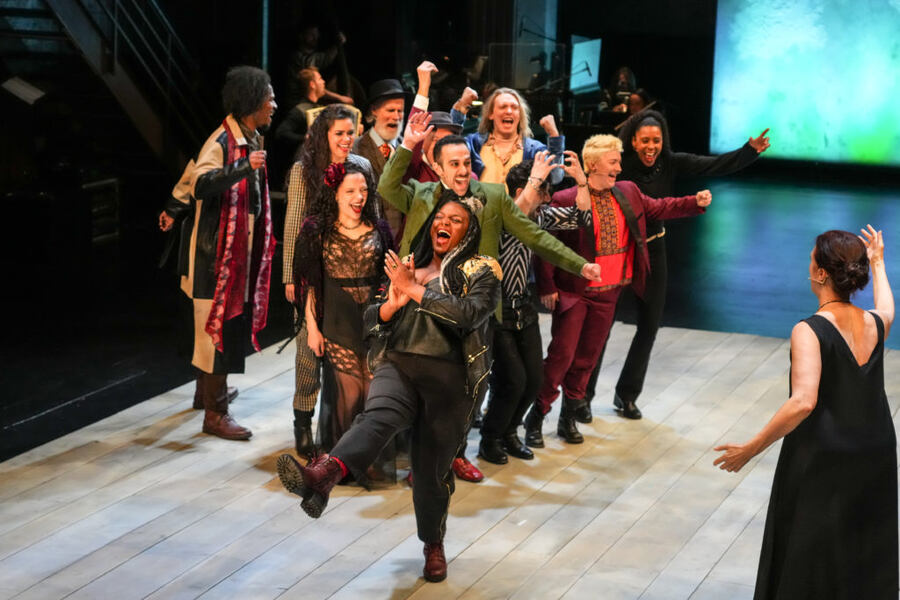
KRYMOV: But remember, the second part of the question was, what would make you think I am a great guy for directing? For instance, let’s say I’m doing Uncle Vanya, you would think, “Oh, a Russian directing a Russian play in America, what can we expect? He wants to weasel himself in.” But say he is doing something Japanese. Is he crazy? He doesn’t know anything about Japanese culture, he is not Japanese, he can’t do that. So what would make you think, “Oh, this is interesting, he is cool”?
BOGART: It doesn’t matter what you do, it’s how you do it, and how the event resonates with the audience. So you could do Uncle Vanya or Katya Kabanova or—I’m trying to think of the name of a Japanese play.
KRYMOV: You’re not going to get nauseous when you hear that I’m doing that? That’s what I’m trying to find out.
BOGART: Me? No. Somebody else might. I mean, you’re not supposed to do anything that isn’t familiar to you. That’s the problem—that’s where we’re moving as a culture, and it bothers me. So I want you to do something Japanese as soon as you possibly can.
KRYMOV: Okay. I’ve started to think about that. I never thought that in Russia. I trusted my intuition when I was in Russia. I could do Turgenev’s Mumu, about the dog; I can do Anna Karenina, and do Boris Godunov, about some guy who managed to get all the power and rose, and how he burned himself at work. There, we had a lot of colors that I can use—I had enough, and I didn’t have to think about that. Now I feel that I have to think, what should I do, and would it be interesting for this particular audience?
BOGART: Do you want to do only Russian material?
KRYMOV: No, no. But even if I’m going to do a Japenese play, I have this in my pocket—it may look like a used toothpaste tube, but I will use it, my Russian aesthetics, my Russian culture, even in a Japanese play. I did Thornton Wilder’s Our Town through my experience; I saw the Arena Stage production 40 years ago in Moscow, and when I did it, I had myself when I was 18 in that show, and I was watching my mother and father. You know, you reach a certain age and everything is connected. There is no subject or object that will not create a theme in me, or a certain pain that is connected to certain objects. I need to feel something. If we’re talking about Japanese art, I discovered there’s a book of haikus written by people before they were put to death, on the last night before they were killed. And I thought, ooh, that’s interesting. They’re writing about the dragonfly and they’re going to die tomorrow. But I think that’s part of Russian culture as well; because without pain there is no such thing as Russian culture, right? And probably other cultures as well, but I know it best—that at the very height of Russian culture, there is always pain.
“You reach a certain age and everything is connected. There is no subject or object that will not create a theme in me.”
BOGART: I’d love to know—this is personal, but I wonder if other people share this curiosity with me—I’m curious how you work with actors.
KRYMOV: I choose actors, and in theory, I choose them in such a way that I know that I will fall in love with them, both men and women. And then it’s very easy after that.
BOGART: How do you start?
KRYMOV: I say, “Guys, let’s start our adventure. We’re going to swim toward that island, we’re going to get to that island, and then we’ll start digging at that island. We might find diamonds. There are beautiful women guarding the island, but somehow we’re going to deal with them as we go through.” You know, you need to attract them with interesting ideas and goals. How do you fish? You get the little worm, you put down the hook, you throw it. And then the fish comes.
BOGART: That’s actually a good description.
KRYMOV: I never thought about it, but you asked.
BOGART: When you say you choose actors you will fall in love with, what is it about them that you fall in love with? What is it that you’re looking for?
KRYMOV: One identifying characteristic of a good actor—it’s not charm, but there should be stage presence, very meaningful stage presence, something behind the charm. Sometimes you make a mistake—you think that it’s there but it isn’t. But that’s the first thing I’m looking for, that I try to identify and see. You know, sometimes you just talk to a person, and you want to continue the conversation. I’ve probably had two or three experiences when I was wrong—when I said, “Oh, that’s a great actor,” but it didn’t end well.
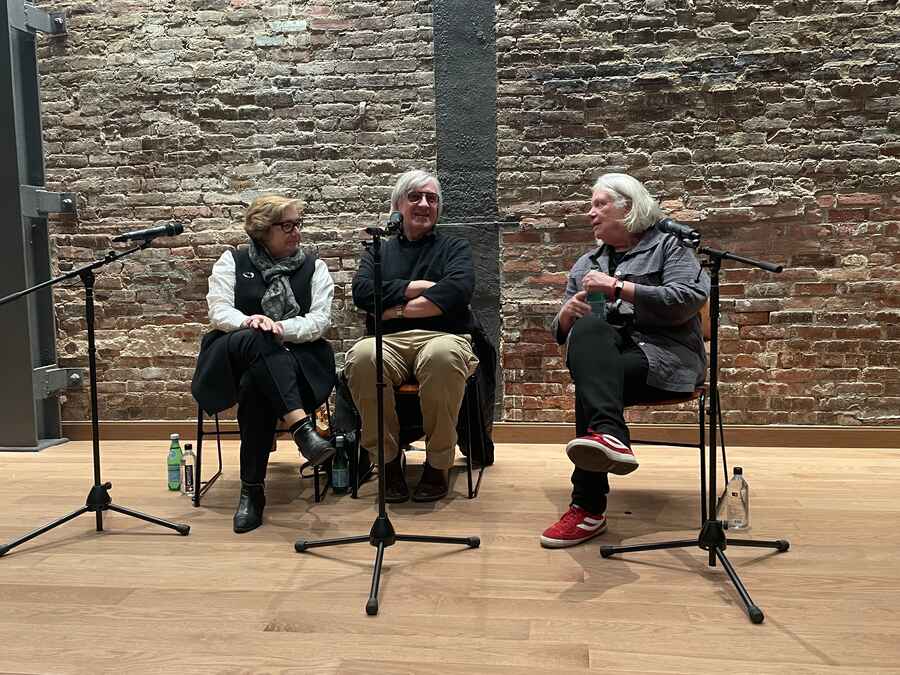
BOGART: I’m also curious, what do you think about audiences? Do you think a lot about audiences? What’s their job?
KRYMOV: Half of the job belongs to the audience. At the beginning—it’s hard to explain. I want to say the first answer is, no, I don’t think about the audience. But that’s not true. It’s much more complicated. I don’t think about it, but there’s a certain feeling. If we’re talking about fishing: When a fisherman goes to fish, he’s not going to think about the fish. He is thinking about the fishing stick, how he’s going to put on the hook, and what you’re going to put on the hook to get the fish, how you’re going to spit on the hook before you throw it in the water. You’re thinking about the process, and that should be a tasty, sort of amazing process.
Important French chefs, do they think about their customers? They think about the food. We were at this restaurant, I don’t know how many Michelin stars it had, and he hates the people who come to eat there, that chef. He loves the process of preparing delicious food. He is fanatically attached to food. He gets up very early, he goes somewhere far to get precious meat. He is doing it for the customers, who are going to pay good money it. But in reality, he does it for himself. If no one shows up at that restaurant, of course, he’s going to be disappointed, and he thinks about that. These Americans came to this French restaurant; they signed up many months in advance. The food was brought out, and they asked for ketchup. And he came out, and he was wearing this huge chef hat, and he said, “You don’t have to pay, you just have to leave.”
BOGART: There are two extremes of directors. There’s the director who’s there all the time—I’m thinking of John Collins of ERS, who did Gatsby and never missed a show. He sat through the eight hours, every single performance, took notes, and they performed that hundreds and hundreds of times. And then there are the current German directors, who won’t even go to previews—they don’t want to be in the room when there’s an audience. I’m also thinking of Kaufman and Hart, who wrote those great comedies in the ’30s. You read in Moss Hart’s book, Act One, that they would pace in the back of the theatre, listening, in the out-of-town tryouts, to the audience and the rhythm, and then they would go to their hotel suites afterwards and rewrite the show based on how the audience responded, how the breathing happened, where there was a rhythm. So there are two extremes. For me, being in the room with an audience is painful, but I feel like I need to be there. I wonder where you stand in that spectrum.
KRYMOV: When you’re directing, are you thinking about the audience before the audience gets there?
BOGART: I am the audience.
KRYMOV: That’s a great answer.
BOGART: I have to have enough ego to think that what tastes good to me will taste good to a lot of people.
KRYMOV: Absolutely.
“Important French chefs, do they think about their customers? They think about the food.”
BOGART: I’ll tell you what, I discovered the secret to directing. You know, in the olden days, when you wanted to see if you were pregnant, you would pee on a piece of paper and see if it changes color. So I think my job is to be litmus paper; the actors pee on me, and they wait to see if I change color. I don’t actually have to say, “Oh, that was good,” or “That was not good.” They can feel my response. Which is why in a rehearsal I never sit down; I have to sort of lean on a stool or stand, because I have to be the best litmus paper possible. Yet when the first preview comes, I have this terribly lost feeling, which is, there’s nowhere to put my jacket or my bag—like, everybody has a place to put their stuff, and I’m wondering, can I leave my bag in a dressing room or an office somewhere? Like, what am I doing here?
KRYMOV: And they don’t pee on you anymore, they pee on the audience, and the audience says, “I’m not pregnant—I’m not pregnant at all.”
BOGART: So my question is, where are you on the spectrum? How are you with audiences? Do you like to be with an audience?
KRYMOV: No. I don’t hate them, but I just can’t. I have to see the first couple of shows, for sure, but I find a place somewhere so that the audience is not near me. It’s very scary, so I usually hide, so I can watch the show but not see the audience. It’s painful, as you said.
BOGART: All directors feel that pain. You feel when it’s not hitting.
KRYMOV: Well, you lose your prerogative of being the master of the situation; you’re not the master and you’re not in control. You come in and it’s done, but you’re not in control. My father, when he was doing his shows, coming home after the show the first thing he would do—we had a landline, and he would pull the telephone landline out. He didn’t want to wait for the phone call. He hated that. He was humiliated by the phone calls. He just didn’t want the phone to ring.
BOGART: My friend and colleague, the great director Tadashi Suzuki—another friend of mine was his assistant for a long time, a big huge Minnesotan named Leon Ingulsrud, who speaks fluent Japanese. He was assisting Suzuki in Japan in a 1,000-seat theatre out in the mountains. There was a full house of 1,000 people, and one of the actors was not doing so well. Suzuki turned to Leon and said, “Go onstage and tell him to calm down!” So Leon went and ran down to the backstage, put on a schmatte, sort of floated onto the stage and over to the Japanese actor, and said, “Calm down!” Leon floated back out and to the back of the theatre, but the actor was still going, so Suzuki told him, “Go back!” Why am I telling this story?
KRYMOV: So that I will tell another story. There is a wonderful director, Oleg Yefremov, he was in charge of Moscow Art Theatre for many, many years. There was an older actor who was playing Goya, the painter, and Yefremov really couldn’t control him—he didn’t know what to do. He had a lot of problems with him. He had created the blocking in such a way that the man was going upfront with a candle, and then he needed to turn around and go back. There was a dress rehearsal with an audience, and Yefremov was in the audience. The man comes out and he doesn’t have a candle. So Yefremov gets up and leaves, and then appears onstage—you should imagine, Yefremov was pretty tall and pretty big—and he is following the actor, right on his toes. The actor looks back, and Yefremov gives him the candle and says, “Take the candle, fuck you,” and quietly walks away.
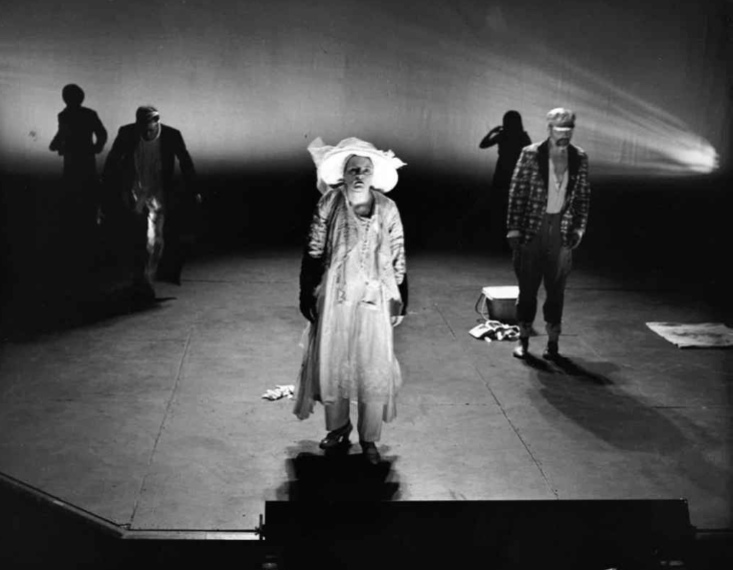
The conversation then opened up to audience questions. One questioner praised both Krymov and Bogart as great ensemble directors, and wondered how they felt about recently losing their ensemble homes—Bogart’s SITI Company dissolved last year and Krymov can’t go back to Russia to the lab he built there.
BOGART: My core value is collaboration. So to work without collaboration makes no sense to me. As for ending an ensemble, it’s 30 years. That’s enough. I don’t want us to turn into old hippies, holding on together. But every rehearsal has to have a sense of ensemble or else I’m not gonna be there. There’s no point if it’s not a collaborative ensemble experience. I wonder what Dima is going to say.
KRYMOV: In Moscow, I had a similar feeling when I left my lab, that it was enough. But here the circumstances have given me this motorcycle, a Harley Davidson that I used to ride, and all of a sudden I’m riding it again together with you guys. I don’t know how it’s going to look from the outside, but I can feel the wind blowing into my face. So we’re on it again.
Another audience question was about Chekhov.
KRYMOV: Chekhov has a specific ability to combine two difficult things together. He is a doctor by education, and he knows that everybody is sick. All his characters, initially, they’re really sick and there’s no hope. He feels this sympathy towards them; he is basically saying goodbye to them, because they’re not going to survive. He is full of love and compassion toward them—and a doctor shouldn’t do that. That’s actually in the way, because when you’re a doctor, you should be very calm and you should treat the patient. But he knows so well that nothing is going to cure these people. He forces us to laugh and to cry with them. He is taking out the eyes and falling on the banana slip at the same time. That’s Chekhov.
BOGART: I’ve done a lot of Chekhov. It’s always about the surface and what lies beneath it. There was one production that I did, we performed it in New York and toured it a lot, it was called Small Lives, Big Dreams. Some very respected Russian actors came to see it and they came up to me afterwards and said it was the most Chekhovian thing they’d ever seen. I’ll tell you what I did with it. There were five actors, and each actor played one of the plays of Chekhov: One actor was The Seagull, one actor was Three Sisters, one actor was Ivanov, one actor was Cherry Orchard, one actor was Vanya. In the first of the four acts, all they did was cross from stage left to stage right, as if they were on a pilgrimage to find where they were going. I went through each of the plays and chose little bits of things they said: “I’m lost,” or, “Look at the sky.” In the first act they could barely speak, they spoke just two or three words each, but we created a symphony of these five actors crossing the stage. And they were carrying things that they didn’t know what they were—a suitcase, a picnic basket, teacups. They’d lost their memory. In the second act, as they crossed again from stage left to stage right, they started speaking in sentences from all of the second acts of the five Chekhov plays. In the third act, they started speaking more; they stopped and had a picnic, and started to remember what living is and what their culture is. And in the fourth act were great speeches from those fourth acts—“We must go on,” “We must live.” It was a group of people who were traveling together and had forgotten who they were, how to get along, what the things they were wearing meant. And slowly, through social intercourse, they found a way to speak and to have conversations and to go on. And the last moment is them actually going on, after those great speeches.
This was a complete deconstruction of Chekhov. Chekhov is so sturdy that you can do that to him—you can actually find him while taking him apart in the biggest deconstruction imaginable. For me, what makes Chekhov a great playwright is that you can crash him on the floor and he stands up again.
Rob Weinert-Kendt (he/him) is the editor-in-chief of American Theatre.

